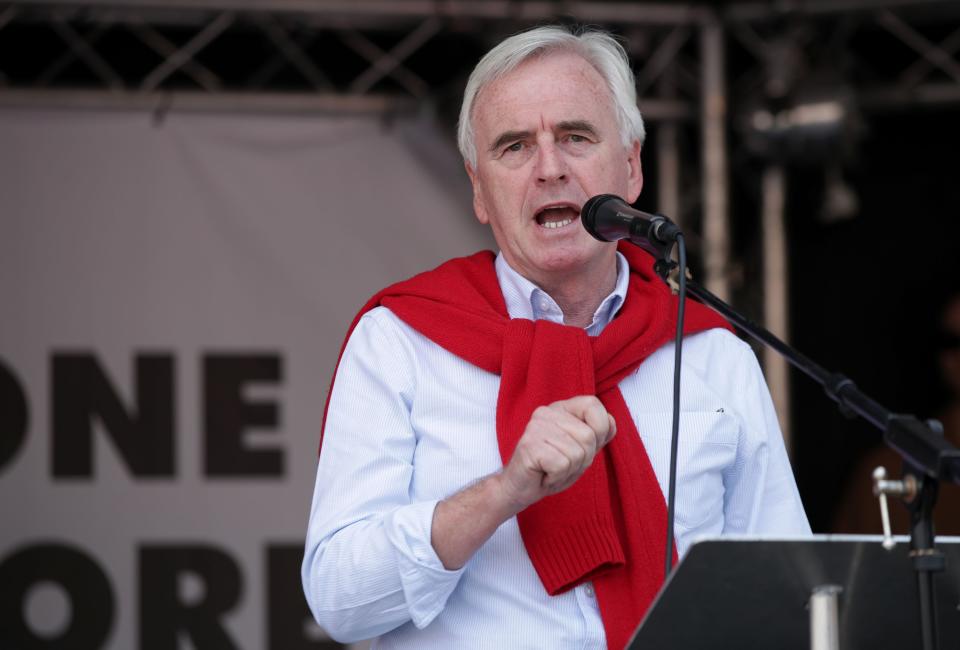Labour would crack down on lending to firms which 'kill the planet'

The Bank of England would crack down on lending to firms which “kill the planet or destabilise our economy” under a Labour government, according to one of party’s most senior figures.
Shadow chancellor John McDonnell used a speech at trade body UK Finance on Monday to outline how Labour would try to stop financial institutions contributing to climate change.
He said large companies would be forced off the London Stock Exchange if they failed to meet new environmental criteria.
McDonnell, seen as Corbyn’s right-hand man, announced a review that will explore how the City is “exacerbating” the problem and how it could help reduce emissions.
READ MORE: May’s net-zero plan could cost £50bn - but it just might work
Labour puts City under the microscope
Commercial and investment banks, pension funds, private equity and other parts of the financial sector will come under the microscope.
Experts including Lord Kerslake, former head of the UK government’s civil service, and the economist Ann Pettifor will carry out the review, with a report due in October.
The Labour MP said the Bank already deterred risky lending through requirements on bank loans, implying similar rules could be introduced to cut investments linked to climate change.
An inquiry will also be held into what McDonnell called the “largely opaque and unregulated” shadow banking sector.
READ MORE: Everything you need to know about Labour’s big nationalisation plans
He said he hoped to increase transparency and accountability around non-bank lending, as well as tackling the sector’s own contributions to climate change.
“Millions of us have our pensions invested directly or indirectly in firms under little scrutiny, who may be putting money into the very companies that are causing the climate emergency,” McDonnell was expected to tell City figures in his speech at UK Finance’s London office.
Bank of England figures released last week showed half of all financial intermediation globally now happens outside the typically more tightly regulated banking sector.
Environmental crisis could be a financial crisis’

McDonnell warned the environmental crisis “could be a financial crisis too,” saying the inflated value of carbon assets that should be left in the ground “has to be addressed.”
He said the review would examine what the Bank of England could do to assess the scale of the threat to financial stability posed by climate breakdown.
The Bank of England would be expected to “stop money flowing” to projects that threaten the planet as well as the economy, according to the shadow chancellor.
The central bank would faced significantly increased political pressure over this objective under plans for a new ‘sustainable investment board’ to hold it to account.
The board would be made up of the chancellor, business secretary and Bank of England governor.
Labour’s £250bn plans
Stephen Jones, chief executive of UK finance, said the government’s existing target of achieving net-zero emissions by 2050 was already a “difficult but critical target.”
He did not comment on McDonnell’s specific policy proposals, but said Labour’s call for a green industrial revolution was “by no means an overstatement” and said UK finance “will not be found lacking.”
McDonnell also said Labour hoped to:
“Harness the full might of the Treasury” to tackle climate change, making it the department’s top priority.
Be as “ambitious as possible” bringing forward the government’s 2050 target for net-zero emissions.
Spend £250bn on “productive investment” through a National Transformation Fund paid for through new government bonds.
Increase spending on solar power and wind turbines after nationalising the national grid network.
Invest in a “potential series of tidal lagoons and barrages around our coast.”
Create 400,000 jobs “on union rates” across the UK through the climate change investments.
Launch a Post Bank, providing local banking services through Post Offices and funding initiatives to cut emissions in small towns and villages.
READ MORE: Average salary in construction soars to £46,000 as UK loses EU workers

 Yahoo Finance
Yahoo Finance 